BIG STORY
Malami Faces Probe Over Five Suspicious Mega Deals Under His Watch
Published
2 years agoon
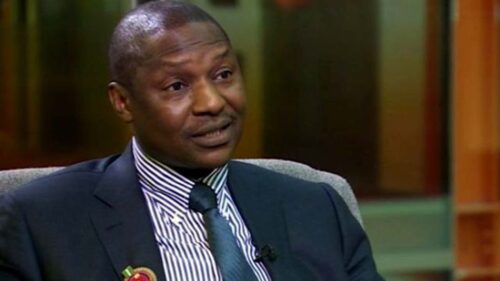
Abubakar Malami, former attorney-general of the federation (AGF), will be questioned over at least five suspicious transactions during his time in office, TheCable understands.
Five of the transactions under investigation are:
- The mysterious payment of $496 million to Global Steel Holdings Ltd (GSHL) as settlement for the termination of the Ajaokuta Steel concession nine years after the Indian company had waved all claims for compensation.
- His handling of the sale of assets worth billions of naira forfeited to the Economic and Financial Crimes Commission (EFCC) by politically exposed persons.
- His role in the $419 million judgment debt awarded to consultants who claimed to have facilitated the Paris Club refunds to the states.
- The strange agreement to pay Sunrise Power $200 million compensation in its dispute with the federal government over the Mambilla power project.
- The duplicated legal fees in the transfer of $321 million Abacha loot from Switzerland to Nigeria.
It was gathered that his name has cropped up in a number of questionable deals under the last administration.
A security agency will handle his interrogation, sources said.
AJAOKUTA DEAL: THE SETTLEMENT AFTER ‘SETTLEMENT’
In September 2022, Malami announced that the federal government had finally resolved the “long-standing contractual dispute” with Global Steel over the Ajaokuta Steel Company Limited (ASCL) and the National Iron Ore Mining Company (NIOMCO), Itakpe, concessions. He said instead of paying the original claim of $5.258 billion by GSHL over the termination of the concessions by the Olusegun Obasanjo administration, Nigeria had secured a 91 percent reduction and would pay $496 million only.
In 2013, Smart Adeyemi, then senator from Kogi state, had said the Goodluck Jonathan administration, which was in power at the time, had recovered the Ajaokuta mill “without any attendant financial obligation whatsoever”.
Malami’s settlement also came five years after Kayode Fayemi, then minister of mines and steel development, announced that Nigeria had resolved all the issues around Ajaokuta and recovered ownership.
Global Steel had entered the Nigerian steel industry in 2004 after securing five major concessions and entering share purchase agreements by the Obasanjo administration. Things went sour when the new administration of the late President Umaru Musa Yar’Adua came to power.
The government, in June 2008, revoked Global Steel’s 10-year Ajaokuta concession on the ground that the company was involved in asset stripping. It also terminated Global Steel’s concession for NIOMCO. This prompted Global Steel to opt for arbitration against Nigeria.
In 2010, a committee headed by Abdullahi Yola, then solicitor-general of the federation, recommended that the Jonathan administration should pay a compensation of $525 million to Global Steel for the revocations. Jonathan opted for mediation, with the Indian-owned company agreeing to mediation reportedly after its “underbelly” was exposed.
It was alleged that Global Steel had violated the terms of the concessions by not bringing in any foreign investment but rather leveraging on the assets of the companies to raise loans from Nigerian banks. It was also alleged that Global Steel had engaged in asset stripping — that is, selling the assets without regard for the company’s fortune. The company was accused of tax evasion and its promoters were to be prosecuted in a Nigerian court.
Faced with possible criminal charges, the promoters gave up their claims to Ajaokuta without any payment by the Nigerian government. In return, Itakpe was to be restored to them because the process of termination was considered faulty, unlike in the Ajaokuta case.
In 2016, the Buhari administration approved the execution of the modified concession agreement with Global Steel which allowed the firm to retain Itakpe. In September 2017, Fayemi announced that all agreements had been signed and Nigeria had now retrieved full ownership of the mills . Yemi Osinbajo, who was then vice-president, executed the agreement on behalf of Nigeria.
“With this development, both NIOMCO and Ajaokuta Steel Company Limited have now reverted to the Federal Government Nigeria, and we can now proceed to engage a new core investor with the financial and technical capacity to run the steel complex,” Fayemi said.
In May 2020, Global Steel curiously threatened to return to arbitration at the ICC sitting in Paris, France, in respect of all the contracts cancelled by the Yar’Adua administration. This was kept out of public knowledge by both the federal government and the company, with some insiders suggesting that the new threat was made in connivance with some senior government officials. The company’s lawyers threatened to claim up to $14 billion in damages but later reduced it to $5.258 billion.
On September 3, 2022, Nigeria announced that it had reached a settlement of $496 million with Global Steel, that it had rescued the Nigerian steel, iron ore and rail industries “from a variety of interminable and complex disputes”. Meanwhile, the legacy allegations of asset stripping, tax evasion and violation of the terms of agreement remain unresolved.
SELLING RECOVERED ASSETS IN THE DARK
In August 2022, Ladidi Mohammed, head of asset recovery and management unit, ministry of justice, was grilled by the EFCC over allegations of fraud but no charges were brought against her.
Mohammed, who is very close to Malami, was grilled over allegations of fraudulent sale of recovered assets worth billions. She was granted administrative bail with strident conditions which she could not meet immediately, and was later invited for further questioning.
She reportedly told EFCC that she acted under Malami’s instructions in disposing of some assets which were forfeited to the federal government by persons undergoing corruption trials. She was unable to produce any documented evidence to back her claims but said instructions were given to her verbally.
Malami had reportedly secretly granted a company and its attorneys a multibillion-naira assets recovery contract. The AGF gave the firm, Gerry Ikputu & Partners, an estate valuer, the task of recovering significant tracts of lands and structures believed to belong to the federal government in 10 states and the federal capital territory (FCT), Abuja. The firm also hired a legal firm, M. E. Sheriff & Co, to act as its agent.
With a confidentiality agreement prohibiting them from disclosing the specifics of the job, Malami’s letter granting them the contract said that they would be entitled to three percent of the value of each successful recovery. The award letter’s “confidentiality” clause forbids contractors from making public “any issue from this engagement without prior consent of the attorney-general of the federation and minister of justice”.
The letter dated October 5, 2021 gave the contractors six months period to lapse in April 2022. In the contract with M.E Sherrif & Co, Malami said the law firm had the duty of handing over the recovered assets to the AGF “for further necessary action and directives”.
He also asked the law firm “to work as a project team in collaboration with the Asset Recovery and Management Unit (ARMU) under the Office of the honourable attorney-general of the federation and minister of justice in carrying out this instruction”.
As many as 74 properties listed in the letter are located in high brow areas in Lagos, Rivers, Akwa Ibom, Cross River, Abia, Anambra, Edo, Enugu, Imo and Delta states and the FCT.
The AGF and the justice ministry came under the spotlight for their role in the recovery and sale of assets which was supposed to be the duty of the EFCC. Itse Sagay, then chairman of the presidential advisory committee against corruption (PACAC), had said there was no justification for engaging private firms to execute the recovery the anti-graft agencies were competent to do.
“The EFCC and the ICPC are authorised to recover stolen public assets. So, there is absolutely no justification for hiring a third party to do what government agencies have powers and experience to do,” he said. “So, it is strange for an outside agency, who does not have that record, and will have to be paid to recover the property. That shouldn’t be; it’s wrong. That doesn’t make sense.”
PARIS CLUB: CLUBBING WITH ‘CONSULTANTS’
In one of the most controversial cases under Malami’s tenure, some consultants, who claimed to have helped the states calculate their share of the Paris Club refunds, sued the federal government to court demanding to be paid their fees.
Malami, in what the governors described as a case of collusion but which he denies, opted for an out-of-court settlement. He agreed that the states — which were still vigorously disputing the claims — would pay $418 million to the consultants and the monies would be deducted from their federation allocations over time.
Ned Nwoko, the senator representing Delta north, was to get $68,658,192.83, while Ted Isighohi Edwards would receive $159,000,000. Others are: Riok Nig. Limited, $142,028,941.95; Orji Orizu, $1,219,440.45; Olaitan Bello, $215,195.36; and Panic Alert Security Systems Limited, $47.821,920.
This generated a public spat between Malami and the governors. While President Muhammadu Buhari initially withheld consent, he eventually approved and the consultants were given promissory notes. A federal high court sitting in Abuja has now restrained the consultants from transacting with the promissory notes.
In August 2022, the Nigeria Governors’ Forum (NGF) said the consultants were using Malami “to hustle” the states’ funds. Malami said that the NGF had no basis to reject the proposed deduction of $418 million, adding that the consultants’ claims were justified.
Abdulrazaque Bello-Barkindo, the forum’s head of media and public affairs, said there was no collective agreement between the consultants and the NGF, adding that the forum has requested the consultants to provide evidence of work done.
“There is no component that compels the governors’ forum to pay consultants anything, and there is no agreement between the consultants collectively and governors collectively,” he said. “The Paris fund money has been exhausted, and the consultants and the attorney general are expecting the money to be deducted from states’ accounts from sources over 52 or 58 months. That is unheard of. And what the NGF is saying is that there is no money to be paid and the monies that have been paid are gross errors.
“Where they are asking the monies to be gotten from is the biggest sacrilege. This money belongs to the states, the masses of this country and because you’re powerful, you want money to be taken and given to you. That’s why they are using the attorney general of the federation to get the money at the source because the state does not have any reason [to pay]. What the attorney general is claiming that there is a consent judgement is what the NGF is saying did not exist.
“What the NGF is saying is tasking is evidence of work done. Some of them said they have constructed primary health cares across the country, and other said they have provided boreholes, these are physical things that you can show. This matter is in court. The court is the only authority that can determine clearly whether there is a reason for payment or not, why are highly placed lawyers afraid of their own platform?”
In 2021, the governors obtained an order from a federal high court in Abuja restraining the federal government from deducting the money from states’ accounts for the purpose of paying the disputed debt.
Malami inexplicably committed Nigeria to pay Sunrise Power $200 million compensation over the Mambilla project without getting clearance from Buhari
MAMBILLA POWER: THE SUN SHINES ON SUNRISE
Early 2020, Malami committed the federal government to paying Sunrise Power and Transmission Company Limited (SPTCL) $200 million to as “final settlement” of the dispute over the Mambilla power project in Taraba state. He also agreed to pay a penalty of 10 per cent in case of a default in fulfilling the settlement agreement — in addition to restoring Sunrise as the local content partner for the $5.8 billion hydroelectric project.
In documents seen by TheCable, Malami and Mamman signed on behalf of the federal government while Leno Adesanya signed as chairman and CEO of Sunrise.
Sources said that Sunrise Power had previously asked for an $80 million settlement in order to withdraw its arbitration claim against Nigeria in France over an alleged breach of contract.
But Babatunde Fashola, who was minister of power, had contended in 2017 that there was no breach of contract as Sunrise had not done any work to warrant any demand or arbitration. Fashola also questioned the integrity of the contract. However, with Fashola’s exit from the ministry, a deal was put together by Mamman and Malami and facilitated by a female figure in Aso Rock.
The project, the biggest plant in the country, was conceived in the 1970s but has suffered severe delays. The 3,050-megawatt facility will be the second largest hydropower plant in Africa when completed.
In 2017, Sunrise Power, which claimed to have been awarded the build, operate and transfer (BOT) contract in 2003, had dragged the federal government and its Chinese partners before the International Chamber of Commerce (ICC) in Paris, France, over alleged breach of contract.
In a letter dated June 20, 2017 to the then Acting President Yemi Osinbajo requesting his intervention in the matter, Adesanya accused the late Abba Kyari, chief of staff to Buhari, of taking the unilateral decision of directing the ministry of power to sideline the company from the contract “against the advice of Malami”.
In the letter dated July 24, 2017 to Osinbajo, with a copy to the chief of staff, Malami had said SPTCL should be engaged as a local content partner to the project “as a means of accommodating its prior contractual interests on the project”.
He backtracked a few weeks later. In another letter dated August 17, 2017 to the company, Malami said he issued the previous opinion on the project based on the limited materials provided at the time. He added that there was no requisite federal executive council (FEC) approval for the project.
“The logical conclusion in the circumstances should be that there was no valid contract between Federal Government of Nigeria and SPTC in respect of the project or at all,” Malami wrote.
Not long after that, TheCable understands, Malami and Adesanya became very close, and the former AGF changed his legal opinion. In a memo to Buhari dated March 26, 2020, Malami asked him to approve the payment of $200 million to Sunrise Power as “full and final settlement” to discontinue the arbitration in Paris and set the government free from all liabilities in the dispute. However, Buhari, in his reply dated Monday, April 20, said: “FG does not have USD 200 million to pay SPTCL”.
The case is still in arbitration.
ABACHA LOOT: $17 MILLION BONANZA FOR LAWYERS
In 1999, federal government engaged the services of Enrico Monfrini, a Swiss lawyer, to help trace, identify, freeze and recover all looted funds traced to Sani Abacha, Nigeria’s military ruler, from 1993 to 1998. After seven years of work, including investigations and litigation across various countries, Monfrini traced and recovered $321 million from Luxemborg banks.
The funds were domiciled with the government of Switzerland in 2014 pending a final request for transfer from Nigeria. Monfrini and other lawyers involved had also been paid their fees, with the Swiss getting about $12 million.
However, Malami, rather than write directly to the Swiss authorities to seek the transfer of the funds to Nigeria, engaged Oladipo Okpeseyi and Temitope Adebayo, two Nigerian lawyers, to do the job again. Their involvement was basically to write to the Swiss authorities to return the funds to Nigeria as there was no asset tracing and recovery involved again.
They were paid $17 million as “professional fees” for writing the letter — more than the Swiss lawyer who traced and recovered the funds over a period of seven years. Okpeseyi and Adebayo were both members of the Congress for Progressive Change (CPC), the party founded by Buhari to contest in the 2011 presidential election. Malami was the legal adviser to the party.
Okpeseyi’s name featured regularly in legal transactions while Malami was in office.
Credit: The Cable
You may like
-
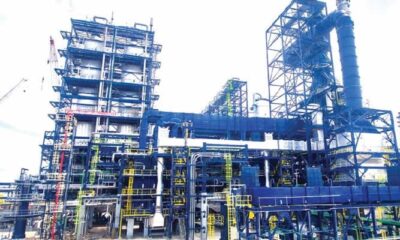

Bulk Fuel Buyers Dump Middlemen For Direct Dangote Supply
-
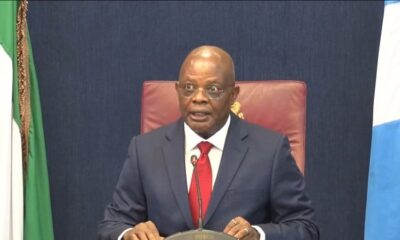

Ibas Rejects Rivers Assembly’s Move To Probe Six-Month Spending
-


FG Revokes 1,263 Mineral Licenses For Annual Service Fees Default
-
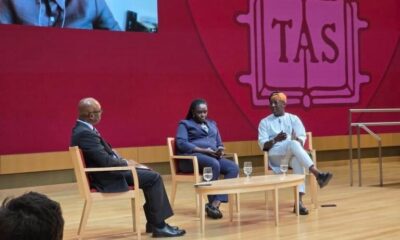

Lagos Commissioner Tokunbo Wahab Highlights Coastal Challenges, Waste Management Reforms At Harvard Climate Panel
-


Two Criminals Who Robbed, Attempted To Kill Lil-Kesh In Lagos Arrested In Kano
-


How Police Tracked, Arrested Notorious Suspect John Samuel Who Shot, Robbed Gbenga Obama At His Epe Hideout
BIG STORY
Bulk Fuel Buyers Dump Middlemen For Direct Dangote Supply
Published
9 hours agoon
September 22, 2025
Bulk fuel buyers and filling station operators across the country are abandoning intermediaries in favour of direct delivery from the Dangote Refinery, following the launch of its free logistics fuel distribution initiative.
This development was disclosed by the President of the National Association of Road Transport Owners (NARTO), Yusuf Othman, during a live interview on TVC News. Othman criticised the refinery’s free delivery system, saying it is undermining existing agreements between bulk fuel users and transporters affiliated with NARTO.
Othman explained that NARTO members operate approximately 30,000 trucks and cannot afford to provide fuel transportation services at no cost. He noted that many of the agreements—both formal and informal—entered into with clients are now being jeopardised.
According to him, many companies had entered into service agreements with NARTO members, some of which were used as collateral to secure bank loans for the purchase of delivery trucks. He lamented that those deals are now under threat, as Dangote Refinery offers free direct delivery to customers.
“Although there has been no formal notification, we have received credible information that customers are being supplied directly, in violation of existing contracts. This has sparked widespread concern among our members,” Othman said.
He called on the Federal Government and the Nigerian Midstream and Downstream Petroleum Regulatory Authority (NMDPRA) to intervene, citing Section 212 of the Petroleum Industry Act (PIA), which he claims prohibits such practices.
Othman urged the Dangote Group to consider the broader implications for other stakeholders in the industry, stating that while the refinery’s success is desirable, it should not come at the expense of other operators’ survival.
When contacted for further comments on Sunday, Othman declined to speak further, revealing that a truce was being considered to allow room for ongoing negotiations.
Prior to this development, middlemen typically procured fuel from depots or refineries and resold to bulk consumers. However, Dangote’s direct-to-customer supply strategy has shifted that model, with buyers now opting for cost-saving direct delivery.
The Dangote Refinery officially commenced its free fuel logistics programme last Monday. The initiative includes the deployment of over 1,000 compressed natural gas (CNG)-powered trucks to distribute fuel across key states.
According to the Dangote Group, the first phase of distribution will cover Lagos, Ogun, Ondo, Oyo, Osun, Ekiti, Edo, Delta, Rivers, Kwara, and Abuja. Plans are underway to expand nationwide as more trucks are added to the fleet.
The new scheme also includes a reduction in pump prices. In Lagos and other South-West states, fuel will retail at N841 per litre, while in Abuja, Rivers, Delta, Edo, and Kwara, the price will be N851 per litre.
In a statement, Dangote Group confirmed that the first deployment phase includes the Federal Capital Territory, Lagos, Kwara, Delta, Edo, Rivers, and South-West states, with nationwide coverage planned as truck availability improves.
Independent Petroleum Marketers Association of Nigeria (IPMAN) President, Abubakar Shettima, confirmed on Friday that deliveries had already commenced. He said Dangote’s trucks were discharging fuel at no cost in several Western states.
Shettima stated that the scheme is operational in Lagos, Ogun, Ondo, and Oyo, adding that the proximity of these areas to the refinery has facilitated early rollout.
He added that marketers under IPMAN were pleased with the arrangement, and confirmed that his members have started receiving products under the free delivery initiative.
Speaking on the pricing, Shettima explained that fuel prices would drop from N865 to N841 per litre at the pump once the Dangote-supplied fuel reaches more stations.
BIG STORY
Benjamin Kalu: Fear Of Hijack Won’t Stop Creation Of State Police
Published
10 hours agoon
September 22, 2025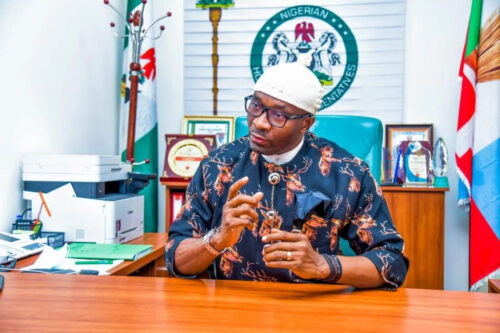
Benjamin Kalu, deputy speaker of the House of Representatives, says concerns about hijack should not prevent the creation of state police.
The national assembly is currently amending the 1999 constitution with the state police bill among the key proposals under consideration.
President Bola Tinubu and several governors have backed the move, saying it would tackle the nation’s prolonged security issues like banditry, kidnappings, and other violent crimes.
“I am reviewing all the aspects of security; I have to create state police. We are looking at that holistically,” Tinubu said early this month.
However, analysts have raised concerns that governors could abuse state police by weaponizing them against the opposition.
‘IT’S FOR GREATER GOOD’
Speaking with journalists on Saturday in Abuja, Kalu, who chairs the House Committee on Constitutional Review, said the unbundling of the current police structure would improve the nation’s security.
“On the state police bill before the parliament, we are thinking about the response time of policing in Nigeria, which at the moment is below the global standard,” he said.
“The only way we can achieve this is if we unbundle it from how it is centralized, like other countries do: Municipal police, and state police.
“Just [as] the constitution is clear on what is on the concurrent and exclusive lists, certain subject matters will now be handled by the state and federal police, respectively.
“Let’s have this conversation on issues like this to know whether you want it or not, or should it be tailored in one way or another.
“There may be fears of hijacking it, but we cannot deny the majority of Nigerians the security of lives and property that we promised them as a government.
“So, we should look at the bigger picture. Everyone in Nigeria may not be a politician, but everyone needs the security of life and property.
“So, we are saying which one should we go for? The greater good or the fear of the minor threat? I think we should go for the greater good so that the good in the majority will suppress the threat in the minority.”
On demand for diaspora voting, Kalu warned that Nigeria must strengthen its local electoral system before allowing citizens to vote abroad.
“Rome was not built in a day. It will happen, but we must first put our house in order. If Nigerians say during constitutional amendment hearings that they want it, we will look at the possibility,” he said.
BIG STORY
Over N2Trillion Siphoned In Fraudulent Fuel Subsidy Claims Under Jonathan —– Otedola
Published
11 hours agoon
September 22, 2025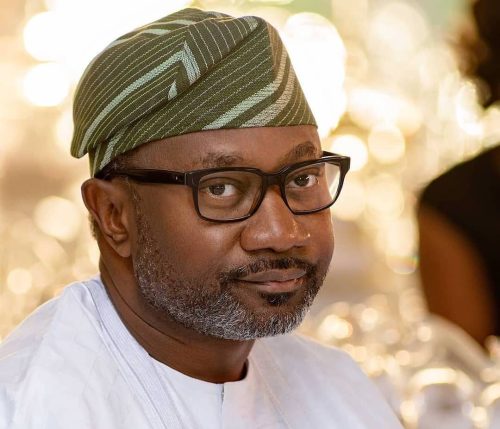
Billionaire businessman, Mr Femi Otedola, yesterday said more than N2 trillion was siphoned in questionable fuel subsidy claims under the Goodluck Jonathan administration, narrating how he warned the ex-President about fraudulent oil marketers at the time.
In a statement on recent issues in the oil and gas sector, especially in the downstream, Otedola also congratulated Aliko Dangote, on the success achieved so far since his refinery commenced operations, describing it as a historic leap for Nigeria’s energy independence and economic future.
The philanthropist maintained that all these fraudulent subsidy claims were tied to depot licenses, noting that the policy rewarded neither transparency nor innovation, but encouraged rent-seeking and corruption.
“On subsidy, I personally warned President Goodluck Jonathan that he was being misled. The system was built to benefit depot owners, and DAPPMAN (Depot and Petroleum Products Marketers Association of Nigeria) members became the primary beneficiaries.
“Over N2 trillion was siphoned through questionable claims, all tied to depot licenses. The policy rewarded neither transparency nor innovation, it encouraged rent-seeking and corruption,” the business mogul stated.
But more importantly, he noted that credit must go to President Bola Tinubu for doing what no other leader before him had the political will to execute, which is the full deregulation of the downstream petroleum sector.
This singular act, he said, has broken the grip of entrenched interests and ushered in a new era of transparency, healthy competition, and customer-centric service delivery.
“In a sector long plagued by rent-seeking, subsidy fraud, product diversion, and smuggling, this reform marks a decisive break from the past and lays the foundation for a more efficient and accountable energy market. Yet despite this progress, there are still voices clinging to the old ways. Voices determined to resist change, even when it’s clear the tide has turned,” Otedola wrote.
Besides, having followed recent commentary around fuel supply issues, Otedola said that he felt compelled to provide some perspective, especially as it relates to the future of the country, pointing out that Nigeria remains threatened by entrenched cabals who still believe they can block the winds of reform.
Specifically, Otedola took on DAPPMAN, a group of oil marketers that has had a running battle with the Dangote Refinery in recent days on the ground of alleged plans by Dangote to monopolise the sector.
Otedola, going down memory lane, recalled that he founded DAPPMAN 23 years ago, specifically in 2002, with a clear mission to challenge the dominance of the major marketers and give independent depot owners a fair platform to thrive.
According to him, at the time, the association aimed to fill critical supply gaps left by an inefficient downstream system. However, he emphasised that since then, times have changed, with many of the original players having exited the scene, and those left, clinging to assets that no longer reflect today’s business realities.
“But history has shown time and again: you can delay change, frustrate it, even sabotage it but you can never stop it. I founded DAPPMAN in 2002 (23 years ago) with a clear mission, to challenge the dominance of the major marketers and give independent depot owners a fair platform to thrive.
“I personally structured the group, appointing the late George Enenmoh, then Managing Director of Ascon Oil, as Chairman, while I served as Vice Chairman and Sayyu Dantata as Secretary. At the time, depot ownership was strategic. We were filling critical supply gaps left by an inefficient system.
“But times have changed. Many of the original players have exited the scene, and those left are clinging to assets that no longer reflect today’s business realities . I advised some of them as far back as last year to sell their depots as scrap while they still had value. Nigeria now has over 4 million metric tons of storage capacity, most of it idle. With the Dangote Refinery now supplying fuel locally, the old business model is crumbling.
“Zenon Oil pioneered the modern diesel business in Nigeria and grew to become the largest supplier in the country. We built depots to store our imported diesel because the market was import-driven and riddled with inefficiencies. But with Dangote’s refinery fully operational, those gaps no longer exist.
“We now have domestic production and local supply efficient, reliable, and proudly Nigerian. Furthermore, we must not fail to recognise the attendant benefits of eliminating the grid lock around the Ibafon , Tincan and Apapa areas due to the operations of the Dangote Refinery,” Otedola argued.
Today, more than just producing fuel, Otedola noted that Aliko Dangote has elevated the entire logistics chain, purchasing 8,000 brand new CNG eco-friendly trucks that will distribute across the country with less pollution and fewer breakdowns, unlike the aging, rickety trucks still used by some operators.
He added: “I know this business intimately. I was king of it and at the peak of it in 2005 (20 years ago) , I was conferred with the life patron of the PTD (Petroleum Tanker Drivers) union by Mr Akinlaja. So, when I say the game has changed, I speak from deep experience.
“What is DAPPMAN fighting for today? To preserve a model built on fuel imports, subsidy exploitation, and outdated infrastructure? That era is fast disappearing. The setting up of depots was mainly to collect PFIs. No depots, no PFIs (Pro Forma Invoices) from NNPC who were sole suppliers of gasoline (petrol) at the time and which thus led to the breeding of complacent importers whose sole agenda was on arbitrage and subsidy margins.”
Since there are no more PFIs, the businessman argued that there is no reason why the Dangote Refinery should subsidise DAPPMAN with N1.5 trillion which they are asking Dangote Refinery to pay and subsequently pass this cost to consumers.
While saluting the courage of ‘my brother Aliko Dangote, like Amazon Incorporated’ in bringing about transformative change in the downstream sector, Otedola emphasised that the myth that depots generate massive employment was untrue.
“Depots do not drive employment as some claim. A typical depot employs perhaps five people, gatekeeper included. In contrast, a single filling station can provide jobs to dozens of Nigerians—from pump attendants to cashiers, security personnel, and cleaners.
“If anything, DAPPMAN members should be focusing on owning and scaling last-mile retail outlets, not holding on to tanks built for a fuel import economy that no longer serves us”, he stated.
Taking a cue from the global picture, the philanthropist pointed out that depots in Amsterdam or Houston were designed to serve export markets, especially Africa, but that with Nigeria now refining locally, such infrastructure is increasingly unnecessary.
“The same thing happened in the cement industry. Once Nigeria started producing cement locally, the bulk carriers that used to dock at our ports were retired, many sold as scrap. The same outcome awaits fuel depots,” he said.
If DAPPMAN members do not adapt, Otedola argued that they will not only become irrelevant, but that they may go bankrupt.
Instead of resisting progress, he urged them to consider selling, restructuring, or investing in new value chains, explaining that if they truly believe in competition, they could even come together and acquire the Port Harcourt Refinery and see if they can succeed where NNPC could not.
Even in developed markets, he stated that refinery operators are downsizing their depot footprint, with many converting them into bonded warehouses or exiting completely and mentioning the case of the Folawiyo Group, known for its foresight and integrity, which sold its depot and exited early. “That is strategic thinking,” he posited.
“DAPPMAN had its place but today, its relevance is fast fading. We must stop clinging to outdated privileges and focus on a new era built on self-sufficiency, transparency, and sustainable value creation. Aliko’s refinery is not the problem. It is the solution. Let’s move forward,” he stated.
Stressing that Africans are proud of Aliko Dangote, he said: “And yes, my dear brother Aliko, you can now go to Monaco and rest jejely like me. You’ve earned it.”
Most Popular
-

 BIG STORY1 day ago
BIG STORY1 day agoHow Police Tracked, Arrested Notorious Suspect John Samuel Who Shot, Robbed Gbenga Obama At His Epe Hideout
-
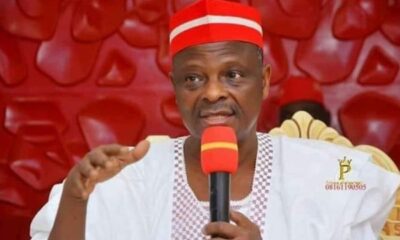
 BIG STORY2 days ago
BIG STORY2 days agoRoad To 2027: We’re Ready To Join APC, Says Kwankwaso, Gives Condition
-

 BIG STORY3 days ago
BIG STORY3 days agoLagos NURTW Official Shamsideen Adio Arrested For Beating Dispatch Rider To Death Over “Car Scratch”
-

 BIG STORY3 days ago
BIG STORY3 days agoBREAKING: Fubara Arrives Port Harcourt Airport
-

 BIG STORY3 days ago
BIG STORY3 days agoProtest Rocks Lagos Over Alleged Killing Of Marwa Driver By NURTW Boss
-
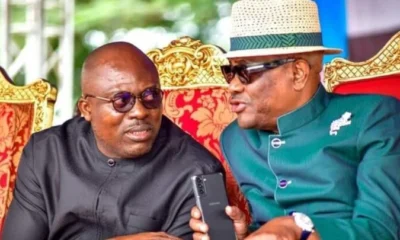
 BIG STORY4 days ago
BIG STORY4 days agoI Drove To Fubara’s Home At 1am To Discuss Rivers LG Elections — FCT Minister Wike
-

 BIG STORY4 days ago
BIG STORY4 days ago2026 World Cup: FIFA Finally Queries South Africa For Breach Of Regulations
-
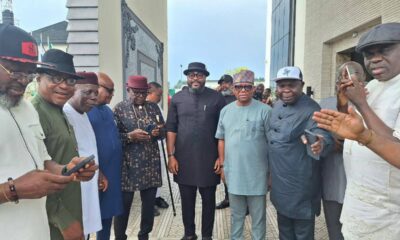
 BIG STORY3 days ago
BIG STORY3 days agoFubara’s Supporters Throng Port Harcourt Airport To Welcome Him [PHOTOS]








